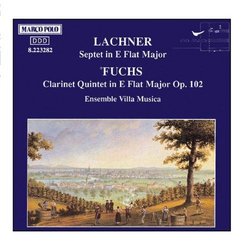| All Artists: Villa Musica Ensemble Title: LACHNER: Septet / FUCHS: Clarinet Quintet, Op. 102 Members Wishing: 0 Total Copies: 0 Label: Marco-Polo Release Date: 7/31/2009 Genre: Classical Style: Chamber Music Number of Discs: 1 SwapaCD Credits: 1 UPC: 730099328227 |
Search - Villa Musica Ensemble :: LACHNER: Septet / FUCHS: Clarinet Quintet, Op. 102
 | Villa Musica Ensemble LACHNER: Septet / FUCHS: Clarinet Quintet, Op. 102 Genre: Classical
|
Larger Image |
CD Details |
CD ReviewsGemütlich Viennese Chamber Music for Strings and Winds J Scott Morrison | Middlebury VT, USA | 03/15/2004 (4 out of 5 stars) "Here we have representative chamber works from two composers who were well-known in their own era but who have essentially disappeared from current concert programs. Franz Lachner (1803-1890) was a younger contemporary of Schubert. The friends were both students of Simon Sechter in Vienna and belonged to the same circle of young musicians; they often took long rambles together in the Vienna Woods. Indeed this Septet, which was not only written at the same time as Schubert's beloved Octet, but uses almost the same instrumental forces, sounds for all the world as if it could have come from Schubert's pen. Each uses strings (including double bass) and winds, a combination I've always found endearing. And think of what the bass adds to Schubert's even better-known 'Trout' Quintet. In Lachner's Septet there is the same pastoral quality that one finds in both the 'Trout' and the Octet. This is Hausmusik of the highest quality. The five-movement structure and the dancing rhythms are evidence that the piece arose from the serenade format so beloved of the Classical period, now made even more gemütlich in Biedermeier Vienna. This is not great music, probably, but it is a superior example of its kind.Robert Fuchs (1847-1927) was himself probably best known as a teacher in Vienna. Among his pupils were Gustav Mahler, Hugo Wolf, Franz Schreker and Franz Schmidt. Interestingly, his older brother, his first teacher, had also been a student of Simon Sechter. His music is marked by expert use of post-Wagnerian chromatic harmony and Brahmsian counterpoint; it tends to bridge the not-so-wide gap between those two supposedly antipodal composers. The Clarinet Quintet, for clarinet and string quartet, perhaps inevitably--after Brahms--has a somewhat autumnal quality. There are some passages that tend toward note-spinning, but there are also moments of rare beauty, as in the Andante sostenuto third movement and the graceful finale. The performances here are by a group unknown to me, Ensemble Villa Musica, which is based in Mainz. Particular mention must be made of the mellifluous playing of clarinettist Ulf Rodenhäuser. Scott Morrison"
|

 Track Listings (9) - Disc #1
Track Listings (9) - Disc #1